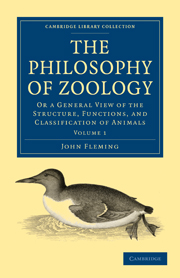 The Philosophy of Zoology
The Philosophy of Zoology Book contents
- Frontmatter
- Preface
- Contents
- Divisions of Natural Science
- CHAP. I Division of Natural Objects into Organised and Inorganic. The Chain of Being
- CHAP. II Peculiar Characters of Organised Bodies
- CHAP. III Distinguishing Characters of Animals and Vegetables
- CHAP. IV On the Polity of Nature
- CHAP. V On the Substances which enter into the Composition of the Bodies of Animals
- CHAP. VI Cutaneous System
- CHAP. VII Osseous System
- CHAP. VIII Muscular System
- CHAP. IX Nervous System
- CHAP. X Organs of Perception
- CHAP. XI Faculties of the Mind
- CHAP. XII Digestive System
- CHAP. XIII Circulating System
- CHAP. XIV Peculiar Secretions
- CHAP. XV Reproductive System
CHAP. XIV - Peculiar Secretions
Published online by Cambridge University Press: 29 August 2010
- Frontmatter
- Preface
- Contents
- Divisions of Natural Science
- CHAP. I Division of Natural Objects into Organised and Inorganic. The Chain of Being
- CHAP. II Peculiar Characters of Organised Bodies
- CHAP. III Distinguishing Characters of Animals and Vegetables
- CHAP. IV On the Polity of Nature
- CHAP. V On the Substances which enter into the Composition of the Bodies of Animals
- CHAP. VI Cutaneous System
- CHAP. VII Osseous System
- CHAP. VIII Muscular System
- CHAP. IX Nervous System
- CHAP. X Organs of Perception
- CHAP. XI Faculties of the Mind
- CHAP. XII Digestive System
- CHAP. XIII Circulating System
- CHAP. XIV Peculiar Secretions
- CHAP. XV Reproductive System
Summary
Under this head, it is our intention to consider the circumstances under which light, electricity and caloric, are generated in the animal system. The subject is exceedingly interesting, and it has been enriched by numerous observations, the united efforts of the naturalist and chemist. Still, however, there prevails a considerable diversity of opinion, respecting the manner in which these substances are produced, or the share which the vital principle contributes towards their developement. As these bodies frequently appear to be produced contemporaneously, in the changes to which matter is subjected, they are to be viewed in this chapter in connection, in expectation that the mode of production of one, may help to illustrate the origin of antoher.
LUMINOUSNESS OF ANIMALS.
The faculty of emitting light does not appear to be possessed by any individuals of the classes Mammalia, Birds or Reptiles, Several fishes, however, exhibit this remarkable property; particularly the Dorado, Mullet, Herring and Sprat. The Spams chrysurus, an inhabitant of the seas of Brazil, is said to be luminous in such a remark able manner, that when a few individuals are swimming in company, they emit so much light, that in & dark night a person might see to read by its aid. But considerable suspicions may be entertained on this subject, whether the light is emitted by the bodies of fish, or by the number of minute parasitical animals which adhere to the surface of the skin.
- Type
- Chapter
- Information
- The Philosophy of ZoologyOr a General View of the Structure, Functions, and Classification of Animals, pp. 364 - 388Publisher: Cambridge University PressPrint publication year: 2009First published in: 1822


